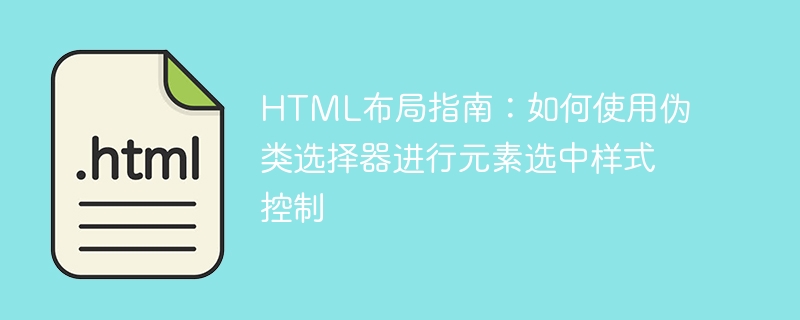Home >Web Front-end >HTML Tutorial >HTML layout guide: How to use pseudo-class selectors for element selection style control
HTML layout guide: How to use pseudo-class selectors for element selection style control
- 王林Original
- 2023-10-20 13:31:411152browse

HTML Layout Guide: How to use pseudo-class selectors to control element selection style
Introduction:
In web design, the control of element selection style is Very important part. HTML provides pseudo-class selectors to control styles of different states of elements, which brings us more flexibility. This article will introduce how to use pseudo-class selectors to control the selection style of elements and provide specific code examples.
1. What is a pseudo-class selector:
A pseudo-class selector is a special selector in CSS, used to select a specific state of an element. They add specific states or conditions to elements, giving them different styles. Pseudo-class selectors can select different states triggered by user interactions (such as mouse clicks, hovers, etc.).
Commonly used pseudo-class selectors include the following:
- :hover: Elements in the mouse hover state.
- :active: The state of the element when it is clicked.
- :visited: The status of the visited link.
- :focus: The state when the element gets focus.
- :first-child: The first child element of the parent element.
- :last-child: The last child element of the parent element.
- :nth-child(n): The nth child element of the parent element.
2. How to use pseudo-class selectors to control element selection style:
In order to better understand how to use pseudo-class selectors to control element selection style, several specific details will be given below: code example.
- :hover pseudo-class selector:
When the mouse hovers over an element, you can change the element's background color, font color and other attributes. The following is an example:
<style>
.box:hover {
background-color: yellow;
}
</style>
<div class="box">鼠标悬停在我上面</div>- :active pseudo-class selector:
When an element is clicked, the element's background color, border style and other attributes can be changed. Here is an example:
<style>
.box:active {
border: 1px solid red;
}
</style>
<div class="box">点击我试试</div>- :visited pseudo-class selector:
is used to style visited links. The following is an example:
<style>
a:visited {
color: gray;
}
</style>
<a href="https://www.example.com">点击访问链接</a>- :focus pseudo-class selector:
is used to set the style when the element receives focus. The following is an example:
<style>
input[type=text]:focus {
border-color: blue;
}
</style>
<input type="text" placeholder="点击输入内容" />- :first-child pseudo-class selector:
is used to select the first child element of the parent element and control its style. The following is an example:
<style>
ul li:first-child {
font-weight: bold;
}
</style>
<ul>
<li>第一个元素</li>
<li>第二个元素</li>
<li>第三个元素</li>
</ul>- :last-child pseudo-class selector:
is used to select the last child element of the parent element and control its style. The following is an example:
<style>
ul li:last-child {
color: red;
}
</style>
<ul>
<li>第一个元素</li>
<li>第二个元素</li>
<li>最后一个元素</li>
</ul>- :nth-child(n) pseudo-class selector:
is used to select the nth child element in the parent element and style it control. The following is an example:
<style>
ul li:nth-child(2n) {
color: blue;
}
</style>
<ul>
<li>第一个元素</li>
<li>第二个元素</li>
<li>第三个元素</li>
<li>第四个元素</li>
<li>第五个元素</li>
</ul>Conclusion:
By using pseudo-class selectors, we can more flexibly control the selection style of elements. Through the specific code examples provided in this article, I believe you have understood how to use pseudo-class selectors to control the selection style of elements. In actual web page layout, reasonable use of pseudo-class selectors will improve user experience and provide a more beautiful interface.
The above is the detailed content of HTML layout guide: How to use pseudo-class selectors for element selection style control. For more information, please follow other related articles on the PHP Chinese website!

